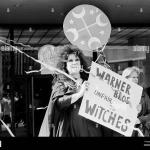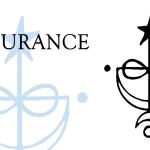This is a post that I swore I would never write. I thought it would hurt my ability to earn a living. But then I realized that if you Google my name you find I’m a Witch who is pro-GLBTQI, supportive of polyamory, and a whole host of other views that limit your opportunities in the conservative South. So why not write this? I won’t garner any more negativity for this post than for any other difficult post I’ve written. And I did promise myself that my writing would be free and brave this year.
I’m an adult woman with Asperger’s Syndrome. I have not yet received a professional diagnosis, but in my research and speaking with other people with Asperger’s I am very certain I have this condition. There are a surprising number of self-diagnosed adult women, as women present differently and tend to go undiagnosed as children. This is not a disease. It’s not something that can be cured. My mind is configured differently from birth, and I simply see and interact with the world in a different way.
There has been a rise of autistic characters on television, and I suppose this is both a boon and a bane. On one hand, they tend to reinforce stereotypes of austistic people that aren’t helpful, and on the other, they help undiagnosed autistic people see their challenges and behaviors reflected in someone else. This is what happened with me. It was actually the character Max on Parenthood that sparked recognition in me. There were times when I felt like I was watching my own childhood. Eventually, as I watched the show explore Max’s character and storyline, it began to dawn on me that maybe I should research Asperger’s.
Just like when I initially began to research Paganism, I approached it single-mindedly. I’ve read countless articles and forum posts. I’ve watched dozens of videos. I’ve looked into the research and approaches of several experts within the field. I cried a lot. I watched Temple Grandin obsessively, as many as 5 times in one day. At the end of all of this, I discovered the originator of most of the stress, heartache and difficulty in my life: Asperger’s.
I wasn’t going to tell anyone. I was simply going to use the new information about myself and the coping strategies I discovered to improve my life. Up until last night I had only mentioned this to three people. Two of them told me I was dead wrong, because I don’t act like a non-verbal, touch-phobic, obsessive ten-year-old boy. I expected this, and I expect there will be comments to this post telling me I’m dead wrong and how normal I am. That will hurt, but that will be ok.
You see, women get a raw deal when it comes to autism. We present differently and often go undiagnosed. We are better able to mimic the behavior of other people, to fake our way through social interactions and our obsessive interests tend to be less odd. A boy who is obsessed with lawnmowers is going to stand out more than a young girl obsessed with literature or history. Plus, other women tend to cover for us, to try to help us seem normal. A quirky little boy is acceptable, but a quirky little girl is not.
Often women are told that if they can perform adequately in social settings 90% of the time, that they aren’t autistic, or that they are claiming autism in an effort to be special. Like many autistic women, I work hard at being social. It has been the monumental struggle of my life to learn to hug others, to chit-chat, and to ask others how they are feeling. Observing social behavior in order to effectively mimic it led to learning to be a good listener. It is ironic that the more successful you are at developing coping skills, the less likely you will receive the help you need. Those who don’t see me as autistic simply pay tribute to my coping abilities, because it’s very rare for anyone to see me with those guards down.
Despite my ability to develop compensating strategies, there will always be struggles and limitations for me. Asperger’s is a syndrome, not a disease. There is no cure. There is no treatment. You see, nothing is wrong with my brain. It’s simply “wired” differently. So like many autistics, although I can feel empathy, I cannot express it properly. Expressing any emotion properly and authentically is difficult. Conveying empathy is particularly difficult. Strong emotion can leave me non-verbal. Emotional arguments and debates are particularly frustrating, because I cannot interact in that way.
I will always have mental tunnel-vision, best capable of a single focus. Switching focus is difficult for me. I can sit and discuss a single topic for hours, but social conversations that leap from subject to subject are difficult for me. Jobs where I’m required to shift focus between very different tasks are very stressful for me. If I’m hip-deep into a subject, it’s hard to drag me out of it.
I will always have physical quirks and issues. Looking people in the eye is somewhat uncomfortable if I’m having a good social day, and almost impossible on a bad day. When I’m alone I will “stim,” or engage in some soothing, repetitive movement, to feel better, or to help focus as I think things through. Most days I’m ok with hugging people, but on days when I’m struggling socially then it can really freak me out to be touched. I had to smile at Temple Grandin’s hugging machine, because as a child I would pull my mattress out from the wall slightly and sleep “hugged” between my mattress and wall, sleeping on the box spring. Today I use really heavy blankets to get the same feeling of being embraced that feels far safer than touching other people.
http://www.youtube.com/watch?v=8VfbbDG8ILII will always be more logical than emotional in my thinking. While this means I have little in common with some of the forms of dialogue that take place in the Pagan community, it also means I have the gift of seeing things from a different perspective. From responses to my writing on this blog, I can only assume that this perspective is considered useful by many of my readers. However, being geared to be at ease with logic more readily than emotion, some forms of humor escape me. I have a hard time understanding subtle emotional cues, particularly in face and body movement. Flirting and subtle sexual cues are confusing to me, and often invisible. Casual sex, alas, is an impossibility for me.
Sensory overload is a very real problem for me. Too much information, too much noise, too many people, too many colors, and too many variables can make me shut down, or worse, melt-down. Airports and shopping malls are a special hell for me.
There are so many gifts to having Asperger’s Syndrome that I don’t consider it a disability. I have a unique perspective. I can see solutions to problems others can’t. I can cut to the heart of a problem quickly. I can take your jacked-up balance sheet and gleefully analyze it until I have it fully balanced. I will spend hours single-mindedly researching the answer to a problem that others might consider dull or boring. There is a reason Spock is well-beloved by the autistic community, because so many of us see ourselves in him.
I’m also a loyal lover and friend. Trusting someone enough to let them into my life makes me fiercely protective of them, even if I can’t always appropriately express empathy for them. Maintaining relationships is not an easy skill for me, so those relationships I nurture mean a great deal to me.
Most people I interact with through life will never realize I’m on the autistic spectrum. Most of my friends will never see me on days when I’m non-verbal and unable to interact appropriately. If I’m lucky, very few people will ever see me melt-down.
I decided to write this post because there may be other adult, austistic females who, like me, find it helpful to hear the stories of women like them, instead of the same stories of non-verbal, difficult ten-year-old boys who have become the public image of autism. I decided to write this post because as I’m processing my initiation it’s very important to understand myself and live authentically. I decided to write this post because saying that I’m autistic publicly forces me to deal with asking for the understanding I need at times.
I decided to write this post because people who care about me decided to have some sort of intervention last night, which included expecting me to express my feelings, express empathy, touching me (in a kind way) and insisting I look them in the eye. So I lost my shit in the middle of a busy Applebee’s, and left driving home crying and full of shame because I will never be the person who can hold your hand, look you in the eye and pour out her heart.
http://www.youtube.com/watch?v=MmGyksmGyUw&feature=relatedI’m lucky though that I’m on the high-functioning end of the spectrum. I am able to “pass” for normal, or neurotypical, most of the time. I enjoy humor and metaphor, and love colloquial sayings. I live at a time when research on autism in women is taking off and there are a lot of resources out there for me. I’m lucky because there are women like Temple Grandin I can look to and know that there is hope, and a way for me to make a difference in this world.
One thing I’ve noticed is that there seem to be a surprising number of atheists among autistic adults. It’s made me consider why this is, and why I find that Paganism suits my neurological makeup so well. I think it’s because the idea of One makes no sense if you are not like other people. The concept of neurodiversity fits very well within a polytheistic viewpoint. In fact, over the past few months as I’ve comes to terms with what it means to be a person with Asperger’s, I’ve begun to wonder if there are Gods who reflect neurodiversity, who are not neurotypical. Surely the wondrous diversity of the earth, and the pluralism of humanity, is reflected in the Divine realms?
I almost didn’t post this. The tarot cards I pulled regarding the decision to publish this were downright scary. I’m in the middle of some scary changes to my life in hopes that I can thrive rather than merely survive. Friends have cautioned me about publicly identifying as autistic. Some social media feedback regarding taking risks was mixed. In the end, I decided being open about this would help me sleep better at night. I fully believe there need to be more adult female voices for autism. So here I am crossing the Rubicon. The die is cast.















